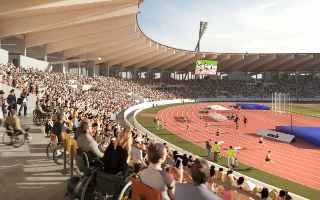Germany: Berlin Senate gives green light for Jahn-Sportpark redevelopment!
source: StadiumDB.com; author: Paulina Skóra
 Plans for building a new stadium and redeveloping the Friedrich-Ludwig-Jahn-Sportpark complex are moving forward. On May 13, the Berlin Senate approved the urban development plan, which will now be submitted to the House of Representatives for further consultation and final approval.
Plans for building a new stadium and redeveloping the Friedrich-Ludwig-Jahn-Sportpark complex are moving forward. On May 13, the Berlin Senate approved the urban development plan, which will now be submitted to the House of Representatives for further consultation and final approval.
Advertisement
What will the investment include?
According to Christian Gaebler (SPD), Berlin’s Senator for Urban Development, the plan provides the foundation for constructing a stadium with a capacity of 20,000 seats. The project also includes a new indoor sports hall, a meeting center for sports organizations, and numerous fields for various disciplines. The current gymnastics meadow will be partially preserved, as will the avenue of plane trees.
The senator also stated that the investment will result in a net gain of 38 trees on the complex grounds. The project also meets environmental protection requirements—the plan confirms that the development is feasible within the framework of species protection laws. Previous demolition work, particularly on the stadium's western stand, had been delayed due to legal disputes related to bird and bat habitats.
 © O+M Architekten
© O+M Architekten
Will the asbestos be properly disposed of?
In recent days, the project encountered new problems. During the demolition of the stadium, large amounts of asbestos were discovered. The construction company in charge is currently storing asbestos-containing waste in the city center, near the popular Mauerpark. In response, the citizens’ initiative Jahn-Sportpark
filed a complaint with the public prosecutor’s office against the Berlin authorities.
Although the public outcry is understandable—asbestos can cause lung cancer, among other illnesses—at the time the stadium was built, asbestos in panel form was most commonly used. This type is only dangerous when the material is damaged. More hazardous is sprayed asbestos, which can release fibers into the air more easily. In the case of Jahn-Sportpark, the waste has been properly sealed and moistened, which prevents asbestos fibers from becoming airborne, making later transport possible. Still, the question remains: Shouldn’t the investor and contractor have anticipated the presence of asbestos, especially since it was widely used in buildings in the former East Germany?
 © O+M Architekten
© O+M Architekten
Will the stadium be ready in 3 years?
Senator Gaebler has estimated the total cost of the new sports complex at €263.4 million—significantly more than originally planned. To stay below the €300 million threshold, some elements of the plan have been reduced.
Gaebler expects construction of the new stadium to begin in 2026, once the urban development plan is officially approved and the old GDR-era stadium is completely demolished. The stadium could be completed in 2028, with the remaining parts of the project finished by 2030. However, the project is not without opposition. A citizens’ initiative has collected over 14,000 signatures against the proposed development.
Advertisement
 StadiumDB
StadiumDB